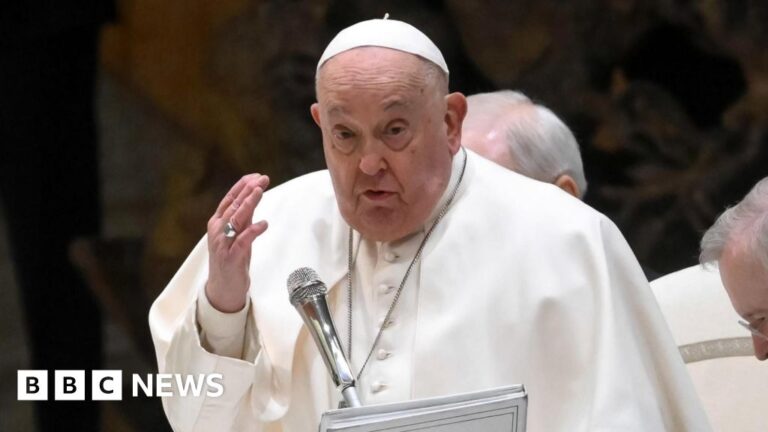“President Elon Musk”? A billionaire, Trump is helping to derail the financial deal being negotiated in Congress
President-elect Donald Trump dealt a fatal blow to bipartisan congressional budget talks by dismissing the measure as a gift-filled event for Democrats after unelected billionaire ally Elon Musk applauded Republican lawmakers who expressed anger and opposition to the bill.
As a result, a partial shutdown of the US government could begin on Saturday. Based on previous shutdowns, this could lead to delays or shutdowns of government services funded by Congress, layoffs of thousands of non-essential workers, and temporary unpaid work for essential workers.
Trump’s first presidency saw two government shutdowns, both over border security funding requests — the longest on record, lasting one day in January 2018 and spanning five weeks in late 2018 and early 2019. .
Trump’s joint statement with Vice President-elect J.D. Vance on Wednesday stopped the bill in its tracks and prompted a flurry of social media posts attacking the legislation, which Musk described as overspending.
“Stop stealing your tax dollars!” Musk wrote on his social media platform X while laying down major challenges to anyone who voted for the budget deal. Musk funneled nearly $200 million to his political action committee to help get Trump elected.
The US government reached a preliminary agreement on raising the debt ceiling a few days before the deadline. Almost every year it brings the country and the world to the brink of economic disaster related to the debt ceiling. Andrew Chang explains what the debt ceiling is and what will happen if it is not raised.
Musk also encouraged Americans to contact their federal representatives to express their disapproval of the bill.
Kentucky Republican Andy Barr said his office has been flooded with calls from constituents.
“My phone was ringing,” he said. “People who choose us listen to Elon Musk.”
Republicans came in for sharp criticism from Vermont independent Bernie Sanders, among others, who joined the Democrats.
“Democrats and Republicans spent months negotiating a bipartisan deal to fund our government. The richest man on Earth, President Elon Musk, doesn’t like it. Will Republicans kiss the ring?” Sanders wrote in the X on Wednesday.
There seems to be a lot of conflict
The episode demonstrated the growing political influence of Musk, whom Trump has chosen along with entrepreneur Vivek Ramaswamy to lead the Department of Government Efficiency, a nongovernmental task force created to find ways to cut federal workers, cut programs and reduce regulations.
All of Musk’s companies intersect with the federal government and are subject to regulation in various ways. SpaceX has billions of dollars in NASA contracts, and he is the CEO of Tesla, an electric car business that benefits from government tax breaks and is subject to auto safety regulations.

Musk’s acquisition of Twitter, a social media platform still used by politicians and governments in 2023, rebranded as X, illegalities have been investigated by the Securities and Exchange Commission (SEC). His other companies include artificial intelligence startup xAI and brain implant maker Neuralink.
“There are direct conflicts between his businesses and the government’s interests,” Ann Skeet, director of leadership ethics at Santa Clara University, told The Associated Press last month. “He can now try to favor those businesses.”
Grover Norquist, president of Americans for Tax Reform and a veteran of Washington’s budget battles, is enthusiastic about Musk’s ability to garner public attention for his efforts to reduce the size of government. But he suggested the owner of a space rocket company was not the right person to lead the spending debate in Congress.
“He doesn’t know politics as much as he knows physics.
Others were excited by Musk’s presence.
“In five years in Congress, I expected a fundamental change in dynamics,” said Rep. Dan Bishop, R-North Carolina. “It came.”
Kentucky Republican Senator Rand Paul even floated Musk’s name as a possible speaker in an op-ed, seeming to relish the prospect of “seeing the collective structure … lose their ever-loving minds.”
The Speaker of the House of Representatives does not have to be a member of Congress. . .
Nothing breaks the swamp short of electing Elon Musk. . . think about it. . . nothing is impossible. (not to mention the joy of seeing the collective establishment, aka “one-partyism” always lose their loved ones…
Reinforced false claims
Trump’s opposition to the proposed legislation has renewed a sense of uncertainty and political limbo in Washington reminiscent of his first term in office.
It was a dramatic turn of events for House Speaker Mike Johnson, who debated the bill and was interrupted by Trump for re-election in just weeks.
Republicans hold a slim majority, raising the possibility of a repeat of the leadership disputes that paralyzed the House a year ago in the final weeks of Kevin McCarthy’s term as speaker and the first weeks of Johnson’s term.
The Biden administration has criticized the possibility of a shutdown.
“Republicans must stop playing politics with this bipartisan deal or they will hurt hard-working Americans and destabilize the country,” said White House press secretary Karine Jean-Pierre.
In his social media posts, Musk sometimes promoted false claims, such as the idea that the legislation would include $3 billion for a new football stadium in Washington. In effect, the legislation would transfer ownership of the land from the federal government to the city, ultimately paving the way for development.
“I love you Elon, but you need to take 5 seconds to check your sources before you highlight click-seeking bottom feeders,” Texas Republican Rep. Dan Crenshaw said on X.
House Minority Leader Hakeem Jeffries, a Democrat, said any fallout from the government shutdown would only affect Republicans.
“You are breaking a bilateral agreement, and you have the consequences,” he wrote on X.
As for Trump, earlier this year his displeasure led Republicans to withdraw from a sweeping bipartisan bill that would have strengthened border security measures.









